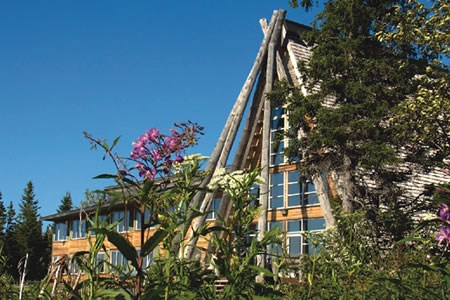Having begun eight years ago as a First Nations effort to spark economic development, the Cree Village Ecolodge is now one of the world’s foremost examples of a green getaway.
Perched upon the island community of Moose Factory, visitors to the Ecolodge can watch as pods of beluga whales slip through the nearby waters of the Moose River. Some seals have become such regular visitors to nearby Charles Island that staff have taken to recognizing them on sight.
However, it’s not the Ecolodge’s uncommon glimpse at nature that has drawn global attention, but rather the centre’s practiced philosophy of “living lightly on the land.” In fact, the facility was designed by the local MoCreebec people as a means of seeking local development in a way that meshed with their identity and their beliefs.
“It’s about being as toxin-free and environmentally friendly as possible,” says general manager Greg Williams.
“It really wasn’t spawned as an ecotourism thing. They didn’t come at it that way, but came at it as, ‘Who are we and what do we want to share with the world?’”
This philosophy is reflected through every choice its staff makes, from flooring to food.
The carpeting which runs down the main hallways is made from pure wool, and bedding is entirely composed of organic cotton. The walls are adorned with low-emission paint and rooms are lit with compact fluorescent lighting.
Furniture is purchased only from companies that can demonstrate that they sustainably harvest the wood they use. Many of the pieces featured throughout the lodge come from Flatrock Furniture, a manufacturer in Indiana.
Even the air fresheners have been replaced as the walls are largely made of cedar. A light spritzing of water is all that’s needed to evoke the strong natural smell of the wood.
Previously, this approach even extended to the use of some special “composting toilets,” though recent flooding has damaged the system, possibly beyond repair. Williams sees this as an opportunity to offset the environmental footprint in a different way, perhaps through the use of solar heating for the domestic hot water supply.
Within the next three years, the Cree Village Ecolodge will likely develop sufficient solar and wind energy to bring itself almost entirely off the electrical grid, Williams says.
If successful, additional solar and wind projects will begin within the local MoCreebec communities, making the lodge a test case for future First Nations development.
Indeed, many MoCreebec family traplines extend throughout the island, with many of the Ecolodge’s board of directors gone for months at time as they live on the land and make use of traditional hunting and fishing techniques.
“When you say you’re an ecolodge, you have to be very cognizant of what’s going on in the world around you before you do anything.”
Even the menu is reflective of the Cree culture, consisting mainly of traditional foods such as caribou and trout, though infused with a modern, international palate. This has led to items such as maple peppercorn smoked trout, with wild rice hand-picked by First Nations communities.
This environmentally-minded approach has brought accolades to the facility, which was recently hailed by global ecotourism guru Hitesh Mehta as an “authentic ecolodge” after he spent six days on site. In fact, the Cree Village Ecolodge was just one of 36 properties he visited around the world, and the only one in North America.
In 2005, the centre was named the Tourism Industry Association of Canada Business of the Year. It was also recently recognized as one of the Significant 29 Aboriginal cultural tourism products in the country by the Canadian Tourism Commission and Aboriginal Tourism Canada.
Despite its somewhat isolated locale, its renown has helped to draw growing numbers of corporate retreats. In such cases, the facility’s expansive hall and restaurant space is converted into a meeting space, complete with wireless Internet and various audiovisual capabilities.
While these corporate capabilities are a distinct draw for such retreats, Williams holds firm in his belief that, deep down, even business visitors will come to understand the Ecolodge’s point of view in time.
“Everybody’s an ecotourist, most people just don’t know it yet,” Williams says. “If they’re not when they get here, they will be by the time they leave.”




